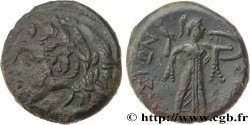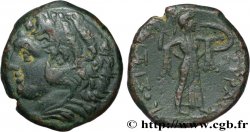v49_0107 - SICILY - SYRACUSE Hemilitron, (MB, Æ 23)
MONNAIES 49 (2011)
Starting price : 195.00 €
Estimate : 300.00 €
Realised price : 270.00 €
Number of bids : 2
Maximum bid : 300.00 €
Starting price : 195.00 €
Estimate : 300.00 €
Realised price : 270.00 €
Number of bids : 2
Maximum bid : 300.00 €
Type : Hemilitron, (MB, Æ 23)
Date: c. 278-276 AC.
Mint name / Town : Sicile, Syracuse
Metal : bronze
Diameter : 23 mm
Orientation dies : 6 h.
Weight : 8,95 g.
Rarity : R2
Coments on the condition:
Exemplaire sur un flan ovale bien centré des deux côtés. Très Beau portrait d’Héraklès à gauche. Joli représentation du revers. Belle patine marron superficielle avec de petites concrétions
Catalogue references :
Predigree :
Cet exemplaire provient du stock du Crédit de la Bourse (1995)
Obverse
Obverse description : Tête imberbe d’Héraklès (Hercule) à gauche, coiffée de la léonté, nouée sous le cou.
Obverse legend : DIOS ELLANIOU
Obverse translation : (Dieu des Grecs).
Reverse
Reverse description : Athéna Promachos (Minerve victorieuse) marchant debout à droite, brandissant le foudre de la main droite et tenant un bouclier de la main gauche, l’égide tombant de l’épaule.
Reverse legend : SURA/KOSIWN
Reverse translation : (des Syracusains).
Commentary
Pour ce type, nous avons deux type bien différents. Au revers, la représentation d’Athéna Promachos fait penser à un statue cultuelle de la déesse qui pouvait être transportée.
For this type, we have two very different types. On the reverse, the representation of Athena Promachos is reminiscent of a cult statue of the goddess that could be transported
For this type, we have two very different types. On the reverse, the representation of Athena Promachos is reminiscent of a cult statue of the goddess that could be transported








 Report a mistake
Report a mistake Print the page
Print the page Share my selection
Share my selection Ask a question
Ask a question Consign / sell
Consign / sell
 Full data
Full data









